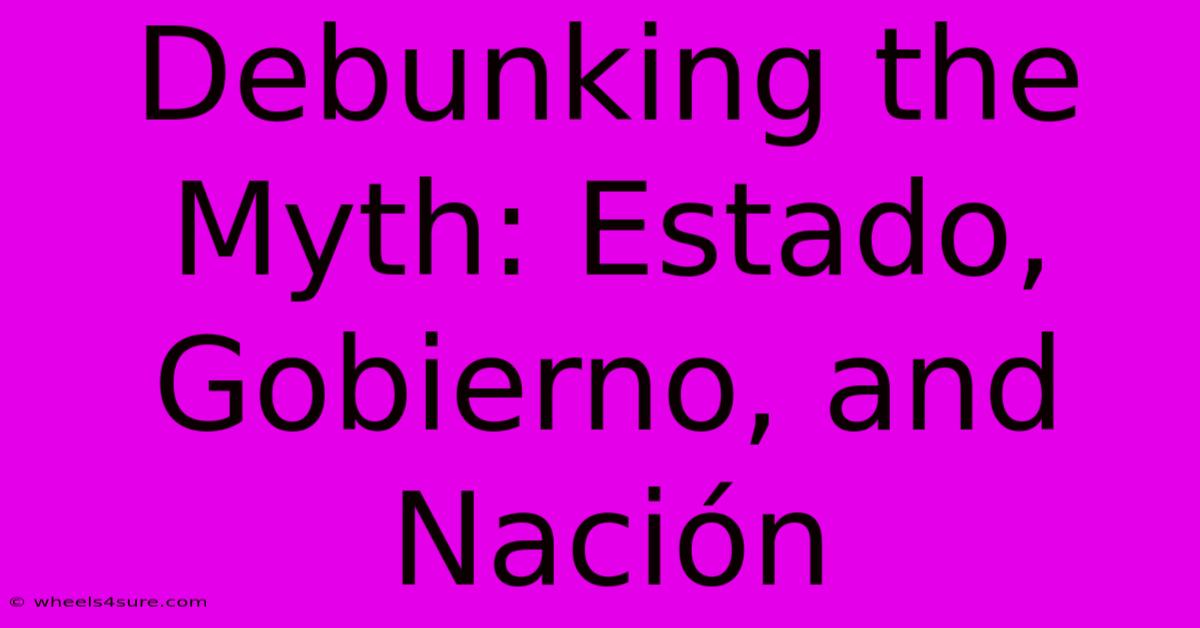Debunking The Myth: Estado, Gobierno, And Nación

Table of Contents
Debunking the Myth: Estado, Gobierno, and Nación
The terms Estado, Gobierno, and Nación are often used interchangeably, leading to considerable confusion. While related, they represent distinct concepts crucial to understanding political systems. This article aims to debunk the myth of their equivalence and clarify the nuanced differences between these three key terms. Understanding their individual roles is essential for comprehending political structures and dynamics worldwide.
What is the Estado (State)?
The Estado, often translated as "State" in English, refers to the permanent, abstract entity possessing a monopoly on the legitimate use of force within a defined territory. It encompasses the entire apparatus of government, including its institutions, laws, and public services. The Estado transcends individual governments and endures beyond changes in political leadership. Think of it as the overarching framework, the legal and institutional structure. Key characteristics of the Estado include:
- Sovereignty: Supreme authority within its territory.
- Territory: A geographically defined area under its control.
- Population: A group of people living within its territory and subject to its laws.
- Government: The administrative arm of the Estado, responsible for executing its policies.
In short: The Estado is the enduring entity, the "thing" itself, while the government is the group of people running it at any given time.
What is the Gobierno (Government)?
The Gobierno, or "Government," represents the temporary, concrete entity responsible for administering the Estado. It's the group of people who hold political power at a specific moment. The government is composed of individuals who exercise power through elected or appointed positions. This means that governments can change through elections, coups, or other means, while the Estado remains.
Key features of the Gobierno include:
- Temporality: It’s not permanent; it changes over time.
- Administration: It’s responsible for implementing the Estado's policies.
- Legitimacy: Its authority depends on the Estado’s legal framework and, ideally, popular consent.
- Executive, Legislative, and Judicial Branches: The structure often (but not always) consists of these three main branches.
In short: The Gobierno is the actor, the group in charge of running the Estado at any given moment.
What is the Nación (Nation)?
The Nación, or "Nation," refers to a community of people bound by shared cultural characteristics, such as language, history, traditions, values, and sometimes religion or ethnicity. A nation is an abstract concept, not necessarily tied to a specific territory or political entity. A nation can exist without having its own state (a stateless nation) or encompass multiple states (a trans-national nation).
Characteristics of the Nación include:
- Cultural Identity: Shared values, beliefs, and traditions.
- Collective Consciousness: A sense of belonging and shared destiny.
- National Identity: A feeling of belonging to a specific nation.
- Potentially Stateless: A nation doesn't necessitate its own Estado.
The Interplay of Estado, Gobierno, and Nación:
The relationship between the Estado, Gobierno, and Nación is complex and often intertwined, but not always perfectly aligned. Ideally, a strong Estado should effectively govern a defined territory inhabited by a cohesive Nación. However, in reality, we often find discrepancies:
- Multi-national States: Many states contain multiple nations within their borders.
- Stateless Nations: Many nations lack their own independent state.
- Weak States: States with weak institutions struggle to effectively govern their territories and populations.
Understanding the distinctions among these three crucial concepts is vital for analyzing political systems, conflicts, and societal dynamics globally. Confusing these terms hinders a proper comprehension of complex political realities. By clearly distinguishing the permanent, abstract Estado, the temporary, concrete Gobierno, and the culturally defined Nación, we achieve a more nuanced understanding of how political power functions and interacts with national identity.

Thank you for visiting our website wich cover about Debunking The Myth: Estado, Gobierno, And Nación. We hope the information provided has been useful to you. Feel free to contact us if you have any questions or need further assistance. See you next time and dont miss to bookmark.
Featured Posts
-
The Seventh Sons Journey To Self Discovery
Apr 02, 2025
-
Aiman Khan Daughter Adorable And Intelligent
Apr 02, 2025
-
Kareena Kapoors Age A Symbol Of Empowerment For Women
Apr 02, 2025
-
Beyond F1 Toto Wolffs Multi Million Dollar Empire
Apr 02, 2025
-
The Untold Journey Of Pink Pantheress And Her Mother
Apr 02, 2025
